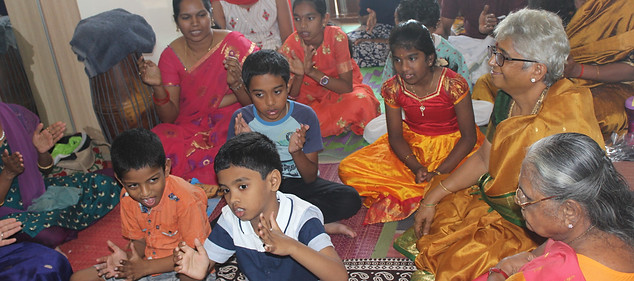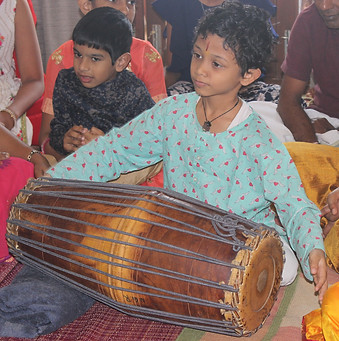IMAIGN



Qualitative study on music therapy
1/18/20
Introduction
My name is Nikhil Kichili. I am a 9th grader at Milpitas High School. I am also a Pragnya (www.pragnya.org) ally and a student of Carnatic vocal and Carnatic saxophone music. I learned about Dr. Meenakshi Ravi and her quest to help special needs children through Music Therapy. I decided to do a project to learn about Dr. Ravi’s music therapy program. My report below is based on my visit to Dr. Ravi’s home in Hyderabad, India. Her home is also a training center, interviews with parents, research from Dr. Ravi’s website - https://meeramusictherapy.org and her recently published book - Health and Harmony.
About the Program
What is the background of the founders of this program?
Dr. Meenakshi Ravi is a musician and is the founder of the Meera Center for Music Therapy. She has vast experience in family counseling and music teaching. Dr. Vidwan NG Ravi( Dr. Meenakshi Ravi’s husband) has been a Mridangam artist for 60 years.
How long has the program been in existence?
This program has been there since 1988.
Who does the program benefit? Specific groups? Disabilities? Developmental? Autistic individuals? Downs Syndrome? Other disorders? Or mental health?
This benefit from the program cuts across all disabilities.
How did they conceptualize this program?
The school was started mainly to provide training in Carnatic vocal music and mrudangam. She conducted a detailed study on ‘Music Therapy for Women with Marital Discord’. She also tried experimenting with various aspects of music like the impact of different ragas on our mind, meditative music, etc. This led to the birth of the Meera Centre for Music Therapy, Education and Research.
How exactly does this program help individuals who are neurodiverse /developmentally different?
This program helps individuals who are neurodiverse calm down, relax and be open. Further covered in question 3 in the section Individuals and program structure.
Please share data behind the success of the program.
Covered in question 14 in the section “Individuals and program structure”. Dr. Ravi has also engaged a researcher to research and publish a paper on the benefits of music therapy.
Does it work for all individuals? What specific areas or skill sets does the program help develop?
This does work for all individuals. Covered in question 3 in the section Individuals and program structure.
How long is the program? Is it an ongoing program or only a workshop?
It is between 40 mins - 60 mins based on the participants’ needs. It is an ongoing program.
How is it funded? Is it grant funded? Donations? Free for individuals who are beneficiaries of the program? Or paid for by the individuals themselves or their families? How much is the program? Are different options available?
It is primarily funded by the fees Dr. Meenakshi Ravi charges the participants. The cost of each class varies with the needs of the participant.
Can instructors be trained to conduct this program? What kind of curriculum is available to train individuals to conduct this program? Do they have to be Carnatic classical musicians? What level of expertise do they need to have?
Yes, the instructors can be trained. In Banglore, Dr. Meenakshi Ravi has trained 3 instructors and there on their own teaching the participants. In Hyderabad, Dr. Ravi is training a therapist who is a Hindustani classical musician. She has made two modules. One module is for instructors trained in music and the other is for instructors with a psychology background. These two modules are to be used to train the instructors.
Individuals and program structure
What is the age range of developmentally disabled individuals who are enrolled here? Does it work for all ages?
The age range of participants about 7-12 years old. But the program works for all ages.
What abilities or levels of need can be addressed here? Verbal vs. Nonverbal; Pitch perfect vs. low cognitive abilities
It can help different abilities and different levels. The program to engage participants will be designed based on their level of current abilities.
What types of behaviors have they seen reduce among these individuals - Stimming (flailing hands, repetitive behaviors, etc) Rocking Back and Forth, Aggression, Verbal stimming, hyperactivity, anxiety, etc
They have seen a neurodiverse child go from non-verbal to verbal. Right now the child is able to sing shlokas and play the Mridangam. They have seen hyperactivity reduced from the child but when I was there since it was a public setting with a lot of people, he got anxious and hyperactive. According to Dr. Vidwan NG Ravi, he has seen significant improvements from the neurodiverse children playing the Mridangam like:
-
Sitting tolerance
-
Eye to eye contact
-
Clarity in speech
-
Mind and body coordination
-
Increasing strength in muscles
-
The joy of listening to pleasant sounds
-
Improved concentration and memory
Are there specific ragas that work for certain conditions? What would they entail? Do individuals need to learn the ragas?
There are no certain ragas that work for certain conditions and the individuals do not need to learn any certain raga. They will learn small shlokas and akarams. The program is designed very similar to that of a typical Carnatic music curriculum for normal kids.
Is there a timeframe. How long does it take to teach a kid a keerthanam, sloka or akarams or song? How long is the kid able to sit down for?
It depends on the grasping ability of each student. If they have problems with their speech it takes time for them to learn a shloka.
Does the session happen in groups or 1:1?
All the sessions are in 1-on-1. Once a month, Dr. Meenakshi Ravi conducts group sessions and when they have to perform on stage there will be more group sessions. The group sessions help the neurodiverse children to have more friends. The parents also report that group sessions help them with social interaction. The 1-on-1 class takes about 40-45 minutes and the group session takes about 1.5 hours.
Is there a structure or procedure for the program?
Dr. Meenakshi Ravi starts with teaching Omkaras, then bhajans and then lastly shlokas.
Does the teacher need to be trained in Carnatic music or psychology or family counseling?
In Bangalore, Dr. Meenakshi Ravi has trained 3 instructors and there on their own teaching the kids. In Hyderabad, One therapist who is a Hindustani musician who has been coming to Dr. Meenakshi Ravi to learn some techniques. She has made two modules for one who has a music background and the other who has a psychology background. These two modules are to be used to train the instructors.
What skills are required to teach these kids?
Covered in the previous section
Is it a private session? Can the parents be in the class?
The main focus is to teach the mom and the child so at home, the mom can teach the child the shloka.
What type of time commitment do they (dev disabled) have to give to this program? How many times a day /week/duration of week etc. ?
The neurodiverse children go for a 1-on-1 class for 1 hour each week. After learning a shloka, the parents at home will have to teach and practice the shloka with their neurodiverse child.
Is it largely vocal? Or instrumental? If instrumental, what are the instruments?
This program is largely vocal which is run by Dr. Meenakshi Ravi. The program also uses instruments like Mridangam which is run by Dr. Vidwan NG Ravi ( Dr. Meenakshi Ravi’s husband). Other instruments such as Saxophone can also be used, especially because it is an ‘air’ based instrument, it will help with breathing and brain simulation.
How successful has the program been? Numbers, Data, etc.
Based on my observation and interviewing the parents, the program has been successful for the neurodiverse children. Also, my research from their website (https://meeramusictherapy.org/achievements.shtml) lists many achievements.
Some of the achievements are:
-
More than 25 students have enrolled in music therapy since its inception and have benefitted immensely.
-
The best achievement is improvement in the overall personality of exceptionally challenged children in music.
-
Programs on music therapy have been telecasted in AIR and Doordarshan.
Workshops
Duration of workshops for instructors
There are no instructors for this program. Dr. Meenakshi Ravi is looking for instructors and researchers.
What should the proficiency level of instructors be to get trained?
Instructors are typically music majors or psychology majors.
The skills required to be a music therapist:
-
Knowledge of music
-
Accept the person
-
Confidentiality
-
Be a good listener
-
Empathy
-
Sincerity
-
Patience
-
Non-judgemental
-
Resourcefulness
-
Knowing one’s limitations
-
Self-disclosure
-
No favors
-
Special precautions
-
Positive and negative transference
-
Recording
Personality Traits:
-
Caring, committed, open-minded
-
Understand the person and the problem
-
Neutral and non-judgemental systematic, service-oriented and sincere
-
Empathize
-
Expect no rewards or returns
-
Listen with interest
-
Loyal to clients
-
Obliging and optimistic
-
Reach out to do the best of the client, respect and love unconditionally
What types of support does her organization provide to people who would like to take it forward here? Educational material, instructor training, in-person workshops, etc.
Dr. Ravi has not paid a lot of thought to this area but is open to explore.
What is the cost of these workshops?
Dr. Ravi has not paid a lot of thought to this area but is open to explore.